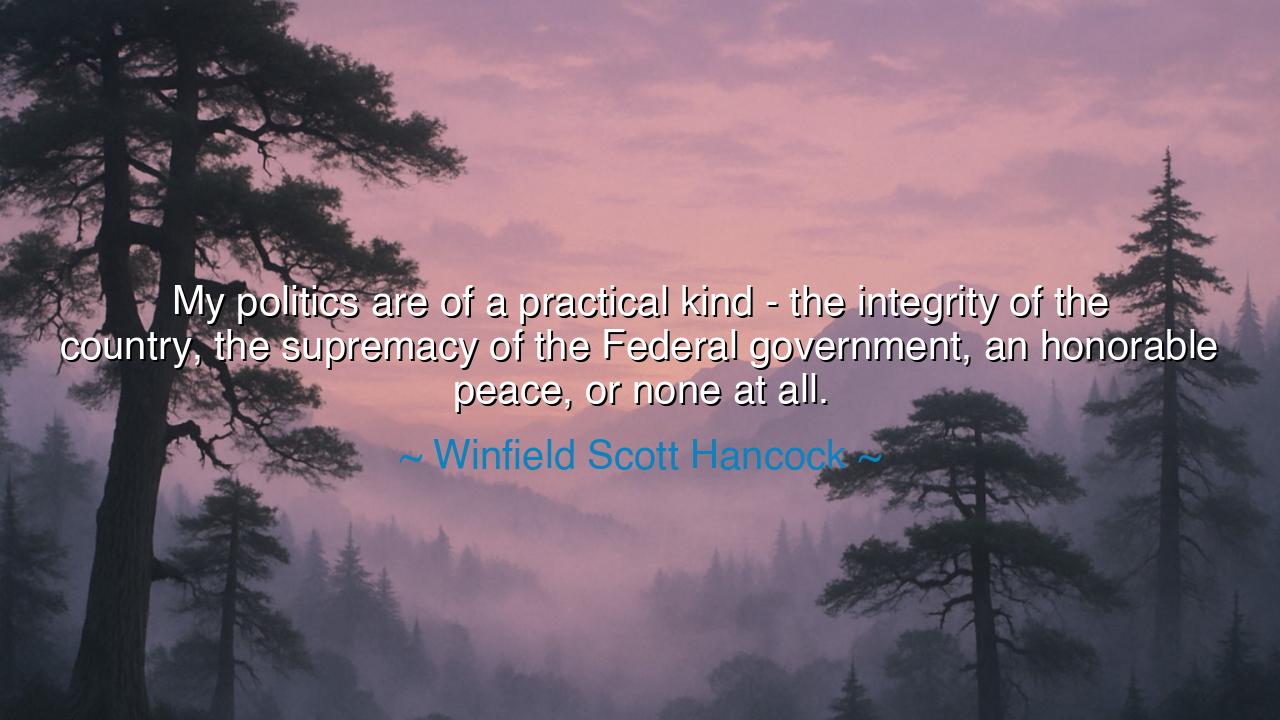
My politics are of a practical kind - the integrity of the
My politics are of a practical kind - the integrity of the country, the supremacy of the Federal government, an honorable peace, or none at all.






"My politics are of a practical kind – the integrity of the country, the supremacy of the Federal government, an honorable peace, or none at all." – Winfield Scott Hancock
In these grave and noble words, Winfield Scott Hancock, the Union general and statesman, speaks as a soldier who has seen both the glory and the ruin of war. His declaration is not one of ambition, but of principle. When he says, “My politics are of a practical kind,” he renounces the vanity of ideology and the corruption of partisanship. For Hancock, the true measure of politics was not in words, but in deeds—the preservation of the nation’s integrity, the defense of lawful authority, and the pursuit of peace that does not come at the cost of honor. His creed stands as a reminder that the first duty of governance is not to victory of party, but to the unity and dignity of the country itself.
The origin of this quote lies in the turbulent years following the American Civil War, when the nation, though no longer divided by arms, was still divided in spirit. Hancock, who had fought with distinction for the Union at Gettysburg and elsewhere, later became a presidential candidate in 1880. His words reflect a lifetime spent balancing duty and humanity, strength and mercy. Having witnessed the horrors of brother fighting brother, Hancock came to believe that true statesmanship demands both firmness and restraint. His loyalty was not to any political faction, but to the enduring idea of America—the Union held together not by force alone, but by shared principles and justice.
When he speaks of “the integrity of the country”, Hancock evokes one of the deepest moral truths of leadership: that a nation’s strength lies in its unity. To preserve that unity requires vigilance, courage, and sacrifice. During the Civil War, Hancock stood at the center of the Union line at Gettysburg, when the Confederate charge threatened to break the North’s defenses. Though wounded, he refused to leave the field until victory was certain. It was there, amid blood and smoke, that his creed was forged. He learned that integrity—in both the man and the nation—is the power to stand firm when all else falters.
Next, he declares his belief in “the supremacy of the Federal government.” In those words, Hancock reaffirms the principle for which so many fought and died: that the United States is not a mere collection of states, but a single, sovereign Union. To him, the federal government was not a tyrant to be feared, but the guardian of law and liberty. He understood, as Washington and Lincoln did, that without a central authority guided by justice, chaos would reign and the Republic would perish. Yet, unlike the despots of old, Hancock’s vision of supremacy was bound by honor—it was the supremacy of law, not of power; of duty, not domination.
Finally, his phrase “an honorable peace, or none at all” reveals the steel within his soul. Having seen the carnage of battle, Hancock longed for peace—but not peace bought with cowardice or corruption. To him, peace must rest on justice, or it is only the prelude to ruin. This conviction echoes through history, in every age where men must choose between compromise and conviction. Like the ancient Roman Cincinnatus, Hancock sought not glory, but righteousness. His peace was not the silence of submission, but the harmony of principles upheld.
The story of Hancock’s life is a testament to his words. After the war, when he was sent to govern the South during Reconstruction, he refused to abuse military power or humiliate the defeated. Instead, he sought reconciliation grounded in respect for civil rights and the Constitution. His fairness won him admiration even from former enemies. In his conduct, we see the living embodiment of his philosophy—practical politics guided by integrity and honor, not vengeance or partisanship.
The lesson of Hancock’s words is eternal: that politics without principle is corruption, and peace without honor is decay. A nation’s survival depends not merely on the might of its armies or the wealth of its markets, but on the moral compass of those who lead it. Let every citizen, then, adopt Hancock’s creed as their own. In times of division, let them defend the integrity of their country. In moments of conflict, let them uphold justice without arrogance. And in the pursuit of peace, let them remember that true peace is born not from surrender, but from strength tempered by conscience.
Thus, let this teaching pass to future generations: be practical, but never base; be peaceful, but never timid; serve your nation not as a partisan, but as a protector of its soul. For as Hancock taught, the destiny of a people rests not in the cunning of politicians, but in the steadfastness of those who hold truth, honor, and unity as their guiding stars.






AAdministratorAdministrator
Welcome, honored guests. Please leave a comment, we will respond soon